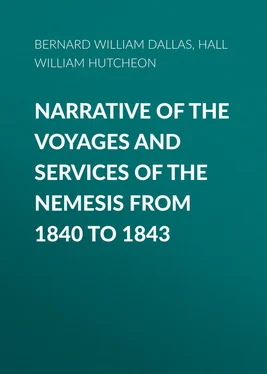William Hall - Narrative of the Voyages and Services of the Nemesis from 1840 to 1843
Здесь есть возможность читать онлайн «William Hall - Narrative of the Voyages and Services of the Nemesis from 1840 to 1843» — ознакомительный отрывок электронной книги совершенно бесплатно, а после прочтения отрывка купить полную версию. В некоторых случаях можно слушать аудио, скачать через торрент в формате fb2 и присутствует краткое содержание. Жанр: foreign_antique, foreign_prose, на английском языке. Описание произведения, (предисловие) а так же отзывы посетителей доступны на портале библиотеки ЛибКат.
- Название:Narrative of the Voyages and Services of the Nemesis from 1840 to 1843
- Автор:
- Жанр:
- Год:неизвестен
- ISBN:нет данных
- Рейтинг книги:5 / 5. Голосов: 1
-
Избранное:Добавить в избранное
- Отзывы:
-
Ваша оценка:
- 100
- 1
- 2
- 3
- 4
- 5
Narrative of the Voyages and Services of the Nemesis from 1840 to 1843: краткое содержание, описание и аннотация
Предлагаем к чтению аннотацию, описание, краткое содержание или предисловие (зависит от того, что написал сам автор книги «Narrative of the Voyages and Services of the Nemesis from 1840 to 1843»). Если вы не нашли необходимую информацию о книге — напишите в комментариях, мы постараемся отыскать её.
Narrative of the Voyages and Services of the Nemesis from 1840 to 1843 — читать онлайн ознакомительный отрывок
Ниже представлен текст книги, разбитый по страницам. Система сохранения места последней прочитанной страницы, позволяет с удобством читать онлайн бесплатно книгу «Narrative of the Voyages and Services of the Nemesis from 1840 to 1843», без необходимости каждый раз заново искать на чём Вы остановились. Поставьте закладку, и сможете в любой момент перейти на страницу, на которой закончили чтение.
Интервал:
Закладка:
If we look for the most thriving mart for slaves upon the east coast of Africa at the present time, we shall find it at the river Quillimane, a little more than five hundred miles to the north of Delagoa Bay. It lies about midway between that settlement and Mozambique. There the slaves are purchased for coarse cloth, gunpowder, beads, cutlery, &c.; and the "arrival of one of the little traders, with his pedler-kind of stock, among one of the native tribes in the interior, becomes the signal for general warfare, in which the weak become the victims of the strong." A few years ago, no less than five thousand slaves were annually exported, from this mart alone, to Rio Janeiro.
It is indeed astonishing that a place so unhealthy in itself as Quillimane should be able to keep up its constant supply of human export. The soil and the very air are no less pestilential than the traffic which debases it; but the effects of the demand are felt far and wide, and, hundreds of miles in the interior, the slave hunt, as it may be called, is carried on; and the ramifications of this odious traffic spread themselves like the branches of the upas-tree, not merely poisoning all within its shade, but becoming more and more infectious as it branches out further from the root.
CHAPTER VII
All preparations being at length completed, on the morning of the 17th of August, just twenty days after having so providentially succeeded in reaching her port of refuge, the Nemesis was once more ready to continue her voyage.
On the 22nd August, she passed near the group of Rocky Islands, called Bassa da India, which are situated nearly in the middle of the channel, and pursued her voyage under sail. Of course, her progress was slow against an adverse wind, and no little anxiety was felt by her captain, on account of the uncertainty of the compasses, and their discrepancy with each other. She arrived, however, safely at Mozambique on the afternoon of the 31st, without having had occasion to use her engines, except just to carry her into the anchorage.
As she passed through the outer roads, she communicated with H.M. brig Acorn, Captain Adams, which was on the look-out for two slavers daily expected to arrive for cargoes; and, the better to entrap them, she had hoisted a sort of decoy-flag at her main, which she had already taken from one of the same description. While a short visit was being paid on board, a pilot had come off from the shore, to conduct the Nemesis into the inner harbour, where she was soon brought to within a quarter of a mile of the town. Little time, however, could be spared for the visit, but there was still some necessary work to be done on board, which could not be completed until the following day.
As the errors of the compasses have been alluded to above, and seem to have occasioned very great anxiety upon this passage, it may be well to make some remarks about them again in this place. It will be remembered, that before leaving Liverpool a long series of experiments had been made, which were intended to provide means of counteracting the local action of the iron of the ship's hull upon the compasses. But no worse place can be imagined than a crowded dock for the purpose of carrying on experiments of such nicety. Disturbing causes were continually operating, and the accident she met with on her way to Portsmouth proved that the correctness of the compasses was very far from being satisfactory. The experiments which were afterwards made at Portsmouth were also very doubtful in their result, in all probability owing, as before explained, to the absence of the boxes of chain or broken iron, which are always used by Professor Airy. It may readily be imagined that the utmost anxiety was always felt on board the vessel on this account, particularly when near the land; and many a long and anxious night has been spent on deck, with frequently a leadsman upon each of the paddle-boxes, to take soundings, and one in the bowsprit besides.
The large magnets, as originally placed in their positions, have never been moved, neither has the compass been changed in the slightest degree. But although they have greatly modified the errors, they have by no means sufficed to correct them. It has been always found the safest course not to put faith in the compasses at all; or rather, in this instance, observation showed that a compass, suspended in a box from a cross spar, at the height of ten or twelve feet above the head of the man at the helm, acted with much more accuracy than any other, and it was always the most relied on whenever it could be used.
It is scarcely to be doubted that the vessel has often made a longer passage than she would have done had the compasses been correct; for, in bad weather, when observations of the celestial bodies could not be taken, she could scarcely have avoided making many errors in her course. But nowhere were these difficulties felt more anxiously than in this passage through the Mozambique Channel, where land could never be very far distant. The necessity for a constant good look-out, and for two or even three men in the chains, produced anxiety and fatigue in itself; while it was also necessary for the officers to have the advantage of taking the altitudes of the stars, whenever the night was clear enough, not only once, but many times during the night. The compasses not only differed from the true points, but differed also from each other; and particularly in the Mozambique Channel, it was observed that they differed more than elsewhere, without being influenced however by the rapid atmospheric changes which prevailed. The more the ship's course was directed towards the true pole, the less was the error of the compass; but gradually, as her course was changed towards the east or west, so did the errors and discrepancies of the compasses increase.
It is satisfactory to know that the same degree of difficulty was not experienced on board the other iron steamers which were sent out afterwards; and as the Nemesis was the first of her class that ever made the voyage, it is right here to record the difficulties she encountered under this head. Many an anxious watch has been spent on deck, trying to catch the altitude of particular stars as they emerged, for a moment, from the dense clouds or haze; and much of this kind of labour, so frequently repeated, would have been saved had her compasses been trustworthy. 9 9 With respect to the effects of lightning upon an iron ship, and the danger which was to be apprehended from the attraction, both of the vessel as a body, and of its particular parts as points for the electrical fluid to touch upon in its passage between the clouds and the earth, no inconvenience whatever seems to have been felt. Much had been said about it in England before her departure for a tropical region. The timid, and those less acquainted with the subject, openly expressed their apprehensions; the learned smiled with more of curiosity than fear; but the officers of the vessel itself were too busy about other matters to give themselves time to think much about the question. During their voyage to the southward, when many dangers were encountered, certainly that from lightning was amongst the least thought of; and now, as they were passing through the Mozambique Channel, a part of the world particularly famous for its heavy storms of thunder and lightning, not the slightest effect from it was observed upon the iron vessel. The funnel has a perfectly smooth top, without any ornamental points, such as are sometimes seen; and the main rigging and funnel stays were made of chain at the top, and rope throughout the rest.
It is now time to return to the anchorage at Mozambique, where we left the Nemesis. Of course as she passed the principal Portuguese fort, she fired a salute, which was returned, and immediately became the signal to the whole town that something uncommon was to be expected. The arrival of a large steamer was soon made known in every direction, and not only became a source of curiosity to all, but an object of great alarm to many. The first impression was that she was sent purposely to put an end to the slave-trade at that place, and the consternation became general; for the governor, of whom more will presently be said, at once encouraged this opinion, which he felt would strengthen his power, as it did his determination, which was proved to be perfectly sincere, to do his utmost to stop the trade. Those most interested in the traffic had already begun openly to defy his power, and had not hesitated to declare to him that they would still carry it on in some of the shallow rivers, where vessels of war could not approach them. But the sight of a large steamer, running along close in shore, almost as if she were a small boat, drawing at the same time only five feet and a half of water, at once damped their ardour. They never could have dreamed that a large heavily-armed vessel could move wherever she pleased through their smallest streams; and their alarm was proportioned to their surprise.
Читать дальшеИнтервал:
Закладка:
Похожие книги на «Narrative of the Voyages and Services of the Nemesis from 1840 to 1843»
Представляем Вашему вниманию похожие книги на «Narrative of the Voyages and Services of the Nemesis from 1840 to 1843» списком для выбора. Мы отобрали схожую по названию и смыслу литературу в надежде предоставить читателям больше вариантов отыскать новые, интересные, ещё непрочитанные произведения.
Обсуждение, отзывы о книге «Narrative of the Voyages and Services of the Nemesis from 1840 to 1843» и просто собственные мнения читателей. Оставьте ваши комментарии, напишите, что Вы думаете о произведении, его смысле или главных героях. Укажите что конкретно понравилось, а что нет, и почему Вы так считаете.












